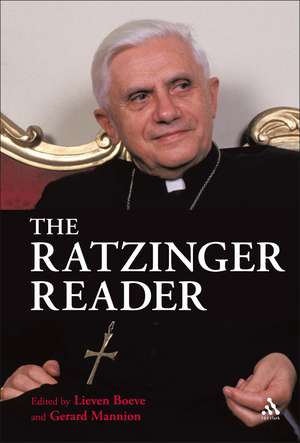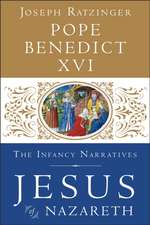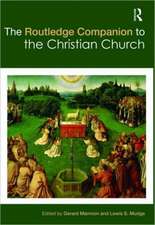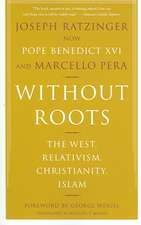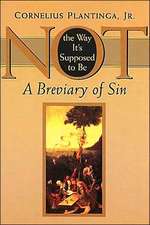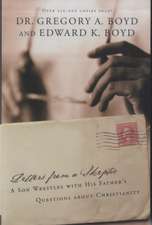The Ratzinger Reader: Mapping a Theological Journey
Editat de Dr Lieven Boeve Autor Joseph Ratzinger Editat de Dr Gerard Mannionen Limba Engleză Hardback – 5 mai 2010
A fascinating and insightful volume collecting together the key writings of Joseph Ratzinger, some of them yet untranslated, from his youthful and more progressive writings, to his 'transition period' following his disillusionment with the aftermath of Vatican II, to his time as Prefect of the Vatican's Congregation for the Doctrine of the Faith down to 2005. The emphasis will be upon Joseph Ratzinger as 'private theologian', his many writings released in a personal capacity for such will chart the formation of and comment upon the official statements and texts released under his name in a more informative fashion than the simple inclusion of the formulaic 'official texts' themselves.
Following a section providing insight into the fundamental and systematic theological background and development of Joseph Ratzinger's thought, further thematic sections will also be included, for example, Joseph Ratzinger's writings on Ecclesiology, on Theology and the Role of Theologians, on the Eucharist, on Religious Pluralism, on Sacramental Theology, Ecumenism, on Truth, on the Contemporary Historical Era, on Magisterium and on Faith Morals etc.
The volume will open with an introductory essay charting the life and career, the achievements of and the controversies surrounding the new pope. Each reading will be prefaced by a brief introduction to its context and themes and will be followed by recommended further reading on its respective subject matter.
| Toate formatele și edițiile | Preț | Express |
|---|---|---|
| Paperback (1) | 239.67 lei 6-8 săpt. | |
| Bloomsbury Publishing – 5 mai 2010 | 239.67 lei 6-8 săpt. | |
| Hardback (1) | 891.92 lei 3-5 săpt. | |
| Bloomsbury Publishing – 5 mai 2010 | 891.92 lei 3-5 săpt. |
Preț: 891.92 lei
Preț vechi: 1142.78 lei
-22% Nou
Puncte Express: 1338
Preț estimativ în valută:
170.68€ • 178.42$ • 144.23£
170.68€ • 178.42$ • 144.23£
Carte disponibilă
Livrare economică 13-27 februarie
Preluare comenzi: 021 569.72.76
Specificații
ISBN-13: 9780567032133
ISBN-10: 0567032132
Pagini: 304
Dimensiuni: 156 x 234 x 28 mm
Greutate: 0.59 kg
Editura: Bloomsbury Publishing
Colecția T&T Clark
Locul publicării:London, United Kingdom
ISBN-10: 0567032132
Pagini: 304
Dimensiuni: 156 x 234 x 28 mm
Greutate: 0.59 kg
Editura: Bloomsbury Publishing
Colecția T&T Clark
Locul publicării:London, United Kingdom
Caracteristici
First textbook to offer a broad selection of Joseph Ratzinger's key texts, many of which have never before been available in English.
Cuprins
PREFACE: AIMS AND APPROACH
INTRODUCTION: Joseph Ratzinger - His Life, Thought And Work
1. THEOLOGICAL FOUNDATIONS (LB) Revelation, Scripture and Tradition Enduring Importance of Church Fathers for Theology Faith and Reason History, Doctrine and Hermeneutics Problems with Modern Theological Hermeneutics a. Introduction b. Theology and Exegesis c. The Limits of Theological Hermeneutics Theology Today
2. HUMANITY AND SALVATION: ANTHROPOLOGY & SOTERIOLOGY (LB) Christology Religious Anthropology Salvation Sacramentology Eschatology
3. UNDERSTANDING THE CHURCH: FUNDAMENTAL ECCLESIOLOGY (GM) The Essential Nature of the Church On the Scope and Tasks of Ecclesiology The Ecclesiology of Communion: a Project on the Way Church Local and Universal: Revisiting the Dilemma The Church of the Future
4. THE CHURCH IN RELATION TO THE WORLD: THE CHALLENGES OF THESE TIMES The Mailaises of Modernity: Liberalism, Atheism, Marxism The Problematic Reception of Gaudium et spes Europe Church, Faith and Politics
5. CHRISTIAN UNITY AND DIALOGUE: ON ECUMENISM AND OTHER FAITHS Extra Ecclesia Nulla Salus (Outside the Church There is No Salvation) Defining Churches and Ecclesial Communities: Orthodoxy, Catholicism and Protestantism Ecumenical Realities Today The Uniqueness of Christian Salvation Against Pluralism and Relativism
6. TEACHING AND AUTHORITY: DIMENSIONS OF MAGISTERIUM The Relationship between the Bishops and the Papacy: a Reading of Lumen Gentium Free Expression and Obedience in the Church The Ecclesial Vocation of the Catholic Theologian The Structure and Task of the Synod of Bishops Magisterium and Morality Conscience, Truth and Dissent
7. LITURGY, MINISTRY AND CATECHESIS Ministry Today The Liturgy and the Life of the Church The Eucharist - Heart of Ecclesial Life The Task of Catechesis The Teaching Office of the Bishop
8. INTERPRETING THE SECOND VATICAN COUNCIL Interpreting the Documents of Vatican II: between the Spirit and the Letter of the Council Interpreting the Dogmatic Constitution on Sacred Liturgy (Sacrosanctum concilum) Interpreting the Pastoral Constitution on the Church in Our Times (Gaudium et spes) Who Has the Authority to Receive Vatican II? Renewal not Revolution
INTRODUCTION: Joseph Ratzinger - His Life, Thought And Work
1. THEOLOGICAL FOUNDATIONS (LB) Revelation, Scripture and Tradition Enduring Importance of Church Fathers for Theology Faith and Reason History, Doctrine and Hermeneutics Problems with Modern Theological Hermeneutics a. Introduction b. Theology and Exegesis c. The Limits of Theological Hermeneutics Theology Today
2. HUMANITY AND SALVATION: ANTHROPOLOGY & SOTERIOLOGY (LB) Christology Religious Anthropology Salvation Sacramentology Eschatology
3. UNDERSTANDING THE CHURCH: FUNDAMENTAL ECCLESIOLOGY (GM) The Essential Nature of the Church On the Scope and Tasks of Ecclesiology The Ecclesiology of Communion: a Project on the Way Church Local and Universal: Revisiting the Dilemma The Church of the Future
4. THE CHURCH IN RELATION TO THE WORLD: THE CHALLENGES OF THESE TIMES The Mailaises of Modernity: Liberalism, Atheism, Marxism The Problematic Reception of Gaudium et spes Europe Church, Faith and Politics
5. CHRISTIAN UNITY AND DIALOGUE: ON ECUMENISM AND OTHER FAITHS Extra Ecclesia Nulla Salus (Outside the Church There is No Salvation) Defining Churches and Ecclesial Communities: Orthodoxy, Catholicism and Protestantism Ecumenical Realities Today The Uniqueness of Christian Salvation Against Pluralism and Relativism
6. TEACHING AND AUTHORITY: DIMENSIONS OF MAGISTERIUM The Relationship between the Bishops and the Papacy: a Reading of Lumen Gentium Free Expression and Obedience in the Church The Ecclesial Vocation of the Catholic Theologian The Structure and Task of the Synod of Bishops Magisterium and Morality Conscience, Truth and Dissent
7. LITURGY, MINISTRY AND CATECHESIS Ministry Today The Liturgy and the Life of the Church The Eucharist - Heart of Ecclesial Life The Task of Catechesis The Teaching Office of the Bishop
8. INTERPRETING THE SECOND VATICAN COUNCIL Interpreting the Documents of Vatican II: between the Spirit and the Letter of the Council Interpreting the Dogmatic Constitution on Sacred Liturgy (Sacrosanctum concilum) Interpreting the Pastoral Constitution on the Church in Our Times (Gaudium et spes) Who Has the Authority to Receive Vatican II? Renewal not Revolution
Recenzii
First as a theologian, then bishop and later the Prefect of the Congregation for the Doctrine of the Faith, Joseph Ratzinger is often thought to have moved steadily to the right. In this collection, Gerard Mannion and Lieven Boeve dispel such easy generalizations. With judiciously chosen and suitably lengthy extracts from Ratzinger's writings, accompanied by helpful editorial comments, these two leading European Catholic theologians demonstrate the continuity of the one Ratzinger and consequently shed light on the complexity of his present-day role as Pope. Anyone who wishes to understand better the current face of Roman theology is greatly in their debt.
An indispensable guide for understanding the theology of Joseph Ratzinger. Belgian Lieven Boeve and Irish Gerard Mannion have charted the theological journey of this German figure who has cast a long shadow for more than fifty years on the church and the world as university professor, expert at Vatican II, but above all as prefect of the Congregation of the Doctrine of the Faith for more than twenty years and now as Pope Benedict XVI. Ratzinger insists that his theological opinions are distinct from his official positions as prefect and pope, but this collection shows otherwise. A very personal theology has become the official theology of the church. This book offers the most comprehensive selection of writings from the various stages of Ratzinger's career arranged according to central topics, which Boeve and Mannion introduce by identifying crucial contexts and critical issues informing these texts.
Anyone attempting to gain serious familiarity with the theology of Joseph Ratzinger will find this book invaluable. Through a judicious selection of texts that represent Ratzinger's thinking in the areas of theology to which he has paid most attention, the editors provide a reliable overview of his thought. They offer informed introductions to each theme that they highlight and to each text that they choose, alerting readers to the context and the main preoccupation of Ratzinger in each of their selections, as well as to possible alternative viewpoints in many cases. This book is not just a conventional reader but a uniquely structured, signposted guide through the terrain of Ratzinger's theology as a whole. It comes at exactly the right time in emerging Ratzinger scholarship, providing a pathway for the uninitiated as well as a compact one-volume resource for those who are further along the road. I recommend it highly.
This Reader, helpfully subtitled, Mapping a Theological Journey, is a valuable contribution to the exposition of and debate about the theological positions of Theologian Joseph Ratzinger, and how far they have changed over the half-century since his years as expert theological advisor (peritus) to Cardinal Frings of Cologne through the Second Vatican Council. The structure of the book is interesting in itself as the editors each select central themes with their sub-themes from Ratzinger's theological writings. With a short evaluative introduction from the individual editor (and further evaluation for the sub-themes) each chapter is mainly devoted to extended texts by Ratzinger himself on theme and subthemes. The three popular questions: Did Ratzinger change his theology over the fifty years from mildly 'liberal' to strongly 'restorationalist?' Did he correctly or incorrectly interpret Vatican II, in which way and at what stage? Is he now leading the Catholic Church back or forward to a pre/post Vatican II condition? However the book is much more than any set of popular comments on these questions with its substantial exposition of Ratzinger's theology through all the major themes of theology. Supporters and critics alike of his theology will learn much from this work and will have much both to agree and disagree with. A must for every theologian's and theological library.
An invaluable, unique resource for readers of Roman Catholic theology. Lieven Boeve and Gerard Mannion provide a rich selection of Ratzinger's writings, including important material that has not previously been easily available. With their judicious, clear supporting material, they enable us for the first time to appreciate the intellectual range of a figure who is inevitably more talked about than studied. Ratzinger's principled, deeply-felt conservativsm in theology comes across as consistently intelligent and challenging.
Mention in New Book Just Published section.
Clear, engaging and readable.
The commentators, helpful throughout this volume in giving background to Ratzinger's various texts, note that his core theological views have not changed dramatically from the 1960s onwards, despite what many others, such as Hans Kung, have argued.
The Ratzinger Reader' is a wonderful resource, especially for those who are relatively new to Ratzinger's corpus...For the time being, anyway, there is no better introduction to Ratzinger's work.
Editor interview featured.
An indispensable guide for understanding the theology of Joseph Ratzinger. Belgian Lieven Boeve and Irish Gerard Mannion have charted the theological journey of this German figure who has cast a long shadow for more than fifty years on the church and the world as university professor, expert at Vatican II, but above all as prefect of the Congregation of the Doctrine of the Faith for more than twenty years and now as Pope Benedict XVI. Ratzinger insists that his theological opinions are distinct from his official positions as prefect and pope, but this collection shows otherwise. A very personal theology has become the official theology of the church. This book offers the most comprehensive selection of writings from the various stages of Ratzinger's career arranged according to central topics, which Boeve and Mannion introduce by identifying crucial contexts and critical issues informing these texts.
Anyone attempting to gain serious familiarity with the theology of Joseph Ratzinger will find this book invaluable. Through a judicious selection of texts that represent Ratzinger's thinking in the areas of theology to which he has paid most attention, the editors provide a reliable overview of his thought. They offer informed introductions to each theme that they highlight and to each text that they choose, alerting readers to the context and the main preoccupation of Ratzinger in each of their selections, as well as to possible alternative viewpoints in many cases. This book is not just a conventional reader but a uniquely structured, signposted guide through the terrain of Ratzinger's theology as a whole. It comes at exactly the right time in emerging Ratzinger scholarship, providing a pathway for the uninitiated as well as a compact one-volume resource for those who are further along the road. I recommend it highly.
This Reader, helpfully subtitled, Mapping a Theological Journey, is a valuable contribution to the exposition of and debate about the theological positions of Theologian Joseph Ratzinger, and how far they have changed over the half-century since his years as expert theological advisor (peritus) to Cardinal Frings of Cologne through the Second Vatican Council. The structure of the book is interesting in itself as the editors each select central themes with their sub-themes from Ratzinger's theological writings. With a short evaluative introduction from the individual editor (and further evaluation for the sub-themes) each chapter is mainly devoted to extended texts by Ratzinger himself on theme and subthemes. The three popular questions: Did Ratzinger change his theology over the fifty years from mildly 'liberal' to strongly 'restorationalist?' Did he correctly or incorrectly interpret Vatican II, in which way and at what stage? Is he now leading the Catholic Church back or forward to a pre/post Vatican II condition? However the book is much more than any set of popular comments on these questions with its substantial exposition of Ratzinger's theology through all the major themes of theology. Supporters and critics alike of his theology will learn much from this work and will have much both to agree and disagree with. A must for every theologian's and theological library.
An invaluable, unique resource for readers of Roman Catholic theology. Lieven Boeve and Gerard Mannion provide a rich selection of Ratzinger's writings, including important material that has not previously been easily available. With their judicious, clear supporting material, they enable us for the first time to appreciate the intellectual range of a figure who is inevitably more talked about than studied. Ratzinger's principled, deeply-felt conservativsm in theology comes across as consistently intelligent and challenging.
Mention in New Book Just Published section.
Clear, engaging and readable.
The commentators, helpful throughout this volume in giving background to Ratzinger's various texts, note that his core theological views have not changed dramatically from the 1960s onwards, despite what many others, such as Hans Kung, have argued.
The Ratzinger Reader' is a wonderful resource, especially for those who are relatively new to Ratzinger's corpus...For the time being, anyway, there is no better introduction to Ratzinger's work.
Editor interview featured.
